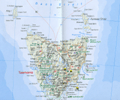Living Desert-Menindee
There is a sculpture exhibition somewhere in town, and Bill says we need to talk to the folks in the Information Center for directions and a key? Fortunately the one place that is open on this, Sunday morning, is the Information Center. The sculpture park is about 6 miles out of town, and indeed you need to rent a key to open the access road. Or you can drive another mile, park publicly, and walk a trail in. That's not worth debating, so we take their map and drive out to the public parking spot. There are two trails, one to the sculpture park, and the other around a flora park and "culture" exhibit.
In the parking lot a couple were filling their water bottles before they set off. The water tank their trunk must have been at least 15 gallons. If that's what the signs mean by making sure you have enough water with you, then we are seriously under-prepared.
Our first reptile. As usual Wayne spotted this guy out of nowhere. We were 50ft away on the other side of this rock so only his chin was showing...
|
 |
| |
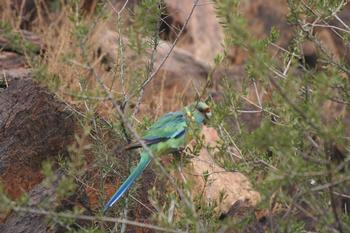 |
It's about a mile winding up through the hills. It's reasonably well populated bird-wise, and we also spot our first (and only) joey watching us from the safety of it's mother's pouch.
I say "we" saw the joey. I'm not sure I did. This is definitely mom, but by the time I'd prepared the camera she'd turned her back on us.
|
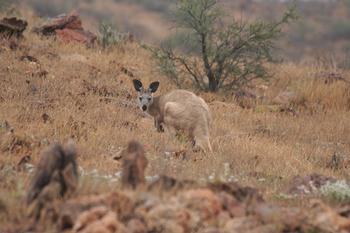 |
| Then at the crest of the hill is the Sculpture Symposium. Created by sculptors from Australia, Mexico, Georgia and Syria, who were invited to Broken Hill in 1993, the 12 pieces carved from huge slabs of rock sit on a hill overlooking the town. The sculptures therefore have a commanding view of the town and each one is carved from a single slab of rock balanced on a pedestal. It's a little disappointing to see that the join is made with concrete, instead of something more timeless and skilled, such as cutting the rock and pedestal to fit. |
 |
But several of the sculptures are not without appeal. The sandstone the organizers provided was so hard that cold chisels couldn't make a dent in it. A public appeal netted tungsten carbide tools from over 200 former miners. I ponder how willing they were. Never a great fan (hard work and claustrophobia never appealing to me) I'm reminded of Mark Twain "giving up smoking is easy, I've done it thousands of times." Giving up mining is incredibly hard. I've only done it once. |
 |
 |
|
Menindee & Kinchega NP
Situated on the banks of the tree lined
mighty Darling, where native bird and
animal life abound among the spectacular
river red gums, Menindee is an oasis in the
Outback, SE of Broken Hill. There’s a sealed road for the 110km to Menindee
and the park entrance, and gravel roads thereafter; before you go, visit the
Broken Hill NPWS to get information about road conditions, or ask at the
Menindee Tourist Information Center (Mon–Fri 9am–5pm, Sat & Sun
10am–1pm), where a detailed, hand-drawn “Mud Map” of the lakes area,
showing areas of interest, is available free of charge.
Menindee sits amongst the
Overflow lakes that form the Menindee
Water Storage Scheme. The lakes, at maximum capacity hold three and a half times more water than Sydney Harbor
and cover an area some seven and a half times greater.
The Menindee lakes are an extensive, natural oasis, feeding the Darling and
Murray rivers and, most importantly, supplying water to Broken Hill; they’re
also a big recreation area, with facilities for camping, powerboating,
water-skiing, sailing, swimming and fishing. The waters protected by the
Kinchega NP, Menindee Lake and Cawndilla Lake, are a haven for waterbirds; a
common sight are little black cormorants (commonly known as shags), floating
in feeding flocks alongside pelicans, with whom they hunt co-operatively.
Burke and Wills
stayed in Menindee at the Maidens Hotel, Yartla Street, on their ill-fated trip
north in 1860. Unfortunately the room in which they stayed is now full of poker
machines, but there is some interpretive material in the hotel (the room’s fittings
are now in the Railway Museum in Broken Hill), and the green courtyard’s a
good place for a drink or a counter meal. Otherwise, you can stay at the Burke &
Wills Motel opposite, or camp in relative comfort at the Menindee Lakes
Caravan Park on Lakes Shore Road, 5km NW of town, which has a kiosk and
grocery store. |
|
 | |
 |
|
 |
The flora park is a little too domesticated for my liking, with an irrigation system and pebbles marking the sides of the path, to say nothing of the electric fence guarding it, which would be a credit to the average penitentiary.
|
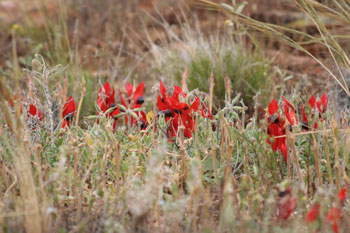 |
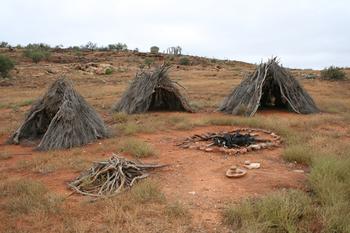 |
The native Sturt Peas that they are trying to re-introduce had been flowering over the previous few weeks, and whilst clearly beyond their prime nevertheless put on enough of a display to give us some idea of their former glory.
Likewise the culture park. Interesting collection of exhibits ranging from a replica aboriginal camp to local artist story poles to an abandoned mine shaft (with a mesh grating over it so you could walk right over the top of it.
Back in town, we spend a few minutes using the Internet connection in the Visitor Center. Not a popular item with the staff. One of the three machines already had a do-not-use sign on it, as did a second one before we were done feeding it coins. I talk to one of the staff about our goal for the night: Menindee, about 75 miles to the south east. There are only two motels, and he volunteers to call the more interesting of the two (where they also serve the only meals). No room at the inn. The other place agrees to accommodate us, but warns us that Kinchega park is inaccessible because the roads are closed. Not yet understanding the full meaning of "the roads are closed" we decide to press on, and confirm the reservation. "Suit yourself." |
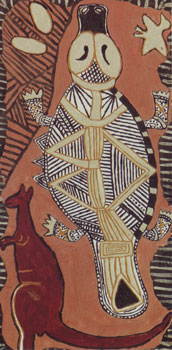 |
Given that one motel seemed full already, when I hear the woman next to me making a reservation at the dugout motel in White Cliffs for the following night, I ask to join the call, and reserve our spot there too.
Finally we stopped at the edge of town for me to check out the art gallery that Bill had recommended as exhibiting and selling local artists. It did, but little was on sale, even less was native, and the prices were eye-popping. I was done in ten minutes. All the galleries were empty except one which was packed with people. More people than we'd seen in total in town over the past twenty hours. I couldn't tell the difference between the art in this room to that in the others, and nobody seemed to have the remotest interest in explaining anything to me. My brother Chris would have described them as "posin' 'til closin'." To be fair, dressed as I was for hiking, it wasn't difficult to spot me as an outsider (and a cheap one). |
 |
On to Menindee. The landscape is notably flatter, and the vegetation sparser. We stop to help another stubby-tail complete the trip across the road. We pass a sign that says "Eastern Time Zone, add 30 minutes." Thirty minutes? We realize that we really have absolutely no idea what time it is. Have we ever adjusted by thirty minutes before? So are we now back in step, or are we moving out of it? If we have no idea what time it is here, we even more clearly have no clue what time it is back home. Oh well.
We're staying at the "Burke and Wills" Motel. Burke and Wills are the Australian Lewis and Clark. They were the first white guys to traverse the continent south to north and back. I ask the proprietor about their connection with the famous pair. "I'm not a history buff, I have absolutely no idea." Wow. No curiosity either I guess. But she calls her son over and I ask the question again. Menindee is on the Darling river which, like the Mississippi, represented a clear boundary between the charted and uncharted territory. It was therefore the last town before the uncharted territory. Not that hard really. |
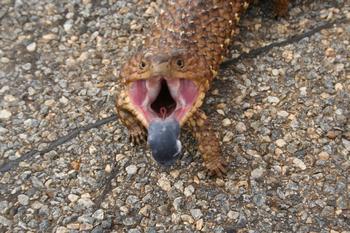 |
We take a drive around town (a two minute task) and start to realize the magnitude of our problem. As we get to the edge of town, the road turns to dirt, and a sign says "road closed." We try another and it is the same. "The roads are closed" doesn't just mean that the park roads are closed, but that all dirt roads are closed, and that therefore since four of the five roads out of town are dirt, the only way out of town is on the (metal led) road we traveled in on.
We retire to the other motel, where there is a meal service. The bar man explains a few things. The National Park we've traveled 100 miles off route to see is supposed to be a water bird haven. The park's lakes here are large enough to be clearly marked on my all-Australia map, but they've been dry for 4 years. The lakes are gone. There's irony for you: the drought has been so long and severe that the lakes have disappeared, yet it is currently so wet that the roads are closed. As you can imagine, this is something of a disappointment, especially for Wayne, who was relying on the water for a considerable number of life birds.
Even if we accept that the reason for being here is shot to hell, the idea of not being able to follow the Darling along the 100 mile hypotenuse of a triangle and instead back-tracking and highway driving almost twice as far is a tad aggravating. Back to the barman.
"What's with the roads?"
"If it clouds over, they close them."
"What's to stop us ignoring the sign?"
"A A$1000 fine."
"That should do it."
"Per wheel."
"Holy wet-weather tires batman!" But he's not all bad news. He's reasonably confident that it will be open again by morning, but we will have to wait until about 9 before we can call to find out if it will open. He also recommends a spot a few miles back where there's still standing water. It is too late now, but we can try it in the morning. We order some food, another beer, and wander around the bar looking at all the notices. One official one says "New South Wales Health Regulations prohibit doggy bags." Two not so official samples say "Sometimes you are the dog, sometimes the hydrant" and "why buy the pig when all you want is a little sausage?" Suit yourself, I liked them.
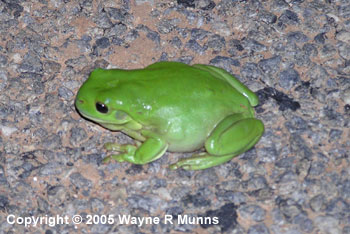 |
We've cleaned our plates, it is 8:02pm and Wayne is still peckish. The fries were good. It is my round so I return to the bar. "Kitchen's closed." "Awe, com'on, it's only just past 8, is there really nothing we can do?" "They'll be half-way home by now." I see what they mean about six-'til-eight. "Two more Tooheys Blacks please."
We went out night-spotting, and spotted nothing except a green (tree?) frog on the road following the Darling. The landlord explained the lack of sightings: the rain (and dew?) run off from the road creates a slightly lusher environment than the surrounding country, which as the drought persists tempts the 'roos closer and closer to the road. After the good rains they've had here, the pickings improve rapidly out in the bush, so the 'roos are more evenly spread across the land—making them less prevalent on the road. |
|



